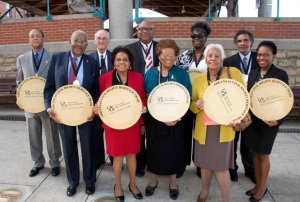The new Arkansas Civil Rights History Audio Tour was launched in November 2015. Produced by the City of Little Rock and the University of Arkansas at Little Rock allows the many places and stories of the City’s Civil Rights history to come to life an interactive tour. This month, during Black History Month, the Culture Vulture looks at some of the stops on this tour which focus on African American history.
The Arkansas Civil Rights Heritage Trail was launched in 2011 by the UALR’s Institute on Race and Ethnicity. Each year, a theme is chosen to honor a particular group of people who were active in Arkansas’s civil rights movement. Year by year, the trail grows. The plan is that over time the trail will stretch from the current starting point at the Old State House, down West Markham Street and President Clinton Avenue to the Clinton Presidential Library and Museum, and then back up the other side of the street to opposite the Old State House.
Politics and Law have been two central pillars in civil rights struggles.
The honorees contributed to those struggles in Arkansas in a number of ways. Annie Mae Bankhead was a community activist in Little Rock’s black College Station neighborhood; Charles Bussey was Little Rock’s first black mayor; Jeffery Hawkins was unofficial mayor of Little Rock’s black East End neighborhood; I. S. McClinton was head of the Arkansas Democratic Voters Association; Irma Hunter Brown was the first black woman elected to the Arkansas General Assembly; Mahlon Martin was Little Rock’s first black city manager; Richard L. Mays and Henry Wilkins III were among the first blacks elected to the Arkansas General Assembly in the twentieth century.
Lottie Shackelford was Little Rock’s first black woman mayor; Wiley Branton was head of the Southern Regional Council’s Voter Education Project in the 1960s; William Harold Flowers laid the foundations for the Arkansas State Conference of NAACP branches; Scipio Africanus Jones defended twelve black prisoners after the 1919 Elaine Race Riot; Olly Neal was the first black district prosecuting attorney in Arkansas; and John Walker for over five decades has been involved in civil rights activism in the courts.
The app, funded by a generous grant from the Arkansas Humanities Council, was a collaboration among UALR’s Institute on Race and Ethnicity, the City of Little Rock, the Mayor’s Tourism Commission, and KUAR, UALR’s public radio station, with assistance from the Little Rock Convention and Visitors Bureau.







